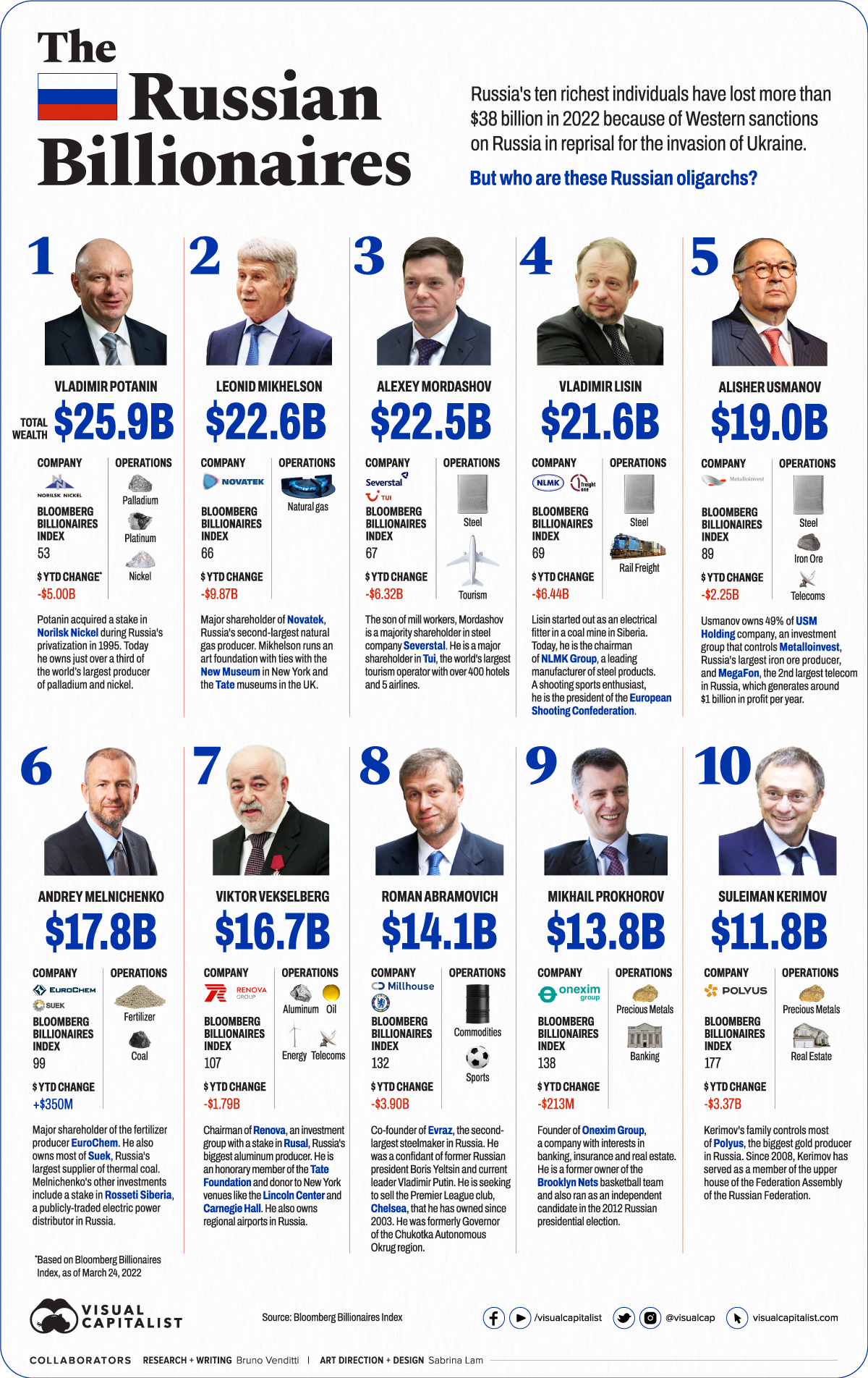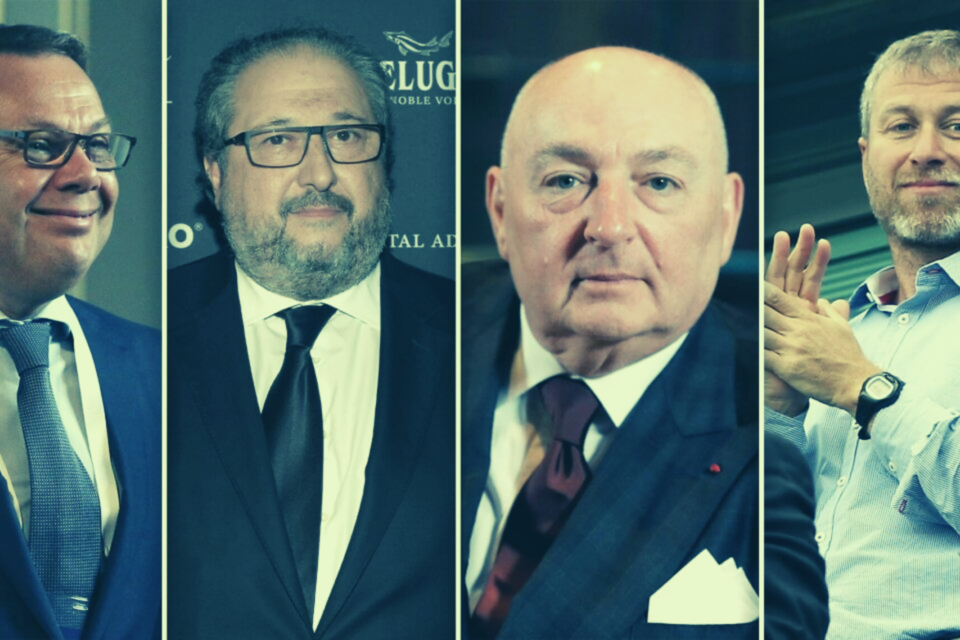Russian oligarchs (a very rich business leader with a great deal of political influence) are corporate oligarchs from former Soviet countries who amassed riches quickly in the 1990s as a result of Russian privatization following the Soviet Union’s disintegration. Due to the contentious ownership of state assets left by the dying Soviet Union, informal transactions with former USSR officials (primarily in Russia and Ukraine) were used to acquire state property. These oligarchs have been linked by historian Edward L. Keenan to the powerful boyar regime that arose in late-medieval Muscovy.
During Mikhail Gorbachev’s period of market liberalization, the first contemporary Russian oligarchs emerged as business-sector entrepreneurs. Because Gorbachev’s reforms produced a period “where the coexistence of regulated and quasi-market prices presented significant opportunities for arbitrage,” these younger-generation entrepreneurs were able to establish their initial wealth. The word “oligarch” comes from the Ancient Greek word ‘oligarchia’, which means “rule of a few.”
Origin
During Mikhail Gorbachev’s perestroika , numerous Russian businesspeople imported or smuggled products into the nation, such as personal computers and jeans, and sold them for a profit, frequently on the black market.
During the 1990s, after Boris Yeltsin was elected President of Russia in July 1991, oligarchs emerged as well-connected entrepreneurs who began with little and grew wealthy through market participation and connections to Russia’s corrupt, but elected, government during the country’s transition to a market-based economy.
The voucher privatization programme of 1992–1994 allowed a few young individuals to become billionaires by arbitraging the large disparity between old domestic pricing for Russian commodities and current world market values. They were termed “kleptocrats” because they kept billions of dollars in private Swiss bank accounts rather than investing in the Russian economy. These oligarchs became immensely unpopular with the Russian populace, and they are widely blamed for much of the chaos that engulfed the Russian Federation after the Soviet Union fell apart in 1991. The oligarchs are “about as popular with your typical Russian as a man casually burning bundles of £50s outside an orphanage,” according to the Guardian.
Post-Soviet corporate oligarchs include government leaders’ relatives or close colleagues, as well as criminal bosses who are frequently linked to the Russian government. During the privatization process supervised by the Yeltsin government in the 1990s, some members of these groups amassed huge fortunes by acquiring state assets at a low cost. Anatoly and Yegor Gaidar, two of the “Young Reformers” most responsible for Russian privatization in the early 1990s, are frequently accused of corruption. “What drove the process was not the drive to construct a society based on universal ideals, but rather the will to adopt a system of private ownership, which, in the absence of law, paved the way for the illegal pursuit of money and power,” writes David Satter, author of Darkness at Dawn.

Also Read : 8 Best No Experience Online Jobs
Exile in Putin era
When Putin came to power in 2000, he used state contracts to help the second wave of oligarchs. In various industries, like infrastructure, defense, and health care, private vendors would overcharge the government at prices far above market, paying bribes to the state officials involved. As a result, Putin awarded a new generation of oligarchs who owed their vast wealth to him.
The billionaires had the upper hand with the Kremlin in the 1990s, and they could even influence policy at times. Several oligarchs rose to formal positions in the government under Yeltsin, and legends abound of cash being brought into the Kremlin in exchange for political favors.
Putin, on the other hand, has been in charge since the early 2000s. Putin essentially presented a bargain in which the oligarchs remain out of politics and the Kremlin stays out of their enterprises, leaving their often illicit profits alone.
Furthermore, public dissatisfaction with the 1990s privatization aided its partial reversal in the 2000s. Putin’s Kremlin used political pressure on oligarchs in critical industries such as media and natural resources to sell controlling holdings back to the government.
Putin also enacted legislation that provided so-called state businesses preferential treatment. The Kremlin’s hold over the economy and the oligarchs was cemented by these efforts
Connections of Oligarchs with Putin
Outsiders with no personal ties to Putin, the military, or the FSB make up the majority of Russian oligarchs. Indeed, several present outsiders are oligarchs from the 1990s. Putin did not intend to systematically “destroy oligarchs as a class,” as he had pledged during his initial election campaign. Instead, he selectively crushed politically inconvenient or obstreperous oligarchs after assuming power. Oligarchs like Vladimir Potanin and Oleg Deripaska, who amassed their fortunes in the 1990s, often appear on lists of the wealthiest Russians today.
Why are Oligarchs being targeted?
Russia’s wealthiest tycoons are seen as important enablers of Putin’s rule by Western countries. The Russian elite, who have stored much of their riches in real estate, sports teams, yachts, and commercial ventures in western metropolises like New York, London, and Barcelona, are the focus of sanctions. At least part of the oligarchs’ holdings are linked to Putin, who most likely hides his immense riches by distributing it among friends and relatives, making it impossible to trace back to him.
However, it’s unclear what, if any, impact sanctions against Russian oligarchs will have on Putin’s behavior. According to Daniel Fried, a former US diplomat who helped formulate the country’s sanctions against Moscow following the 2014 invasion of Crimea, Russia’s elites don’t govern Putin—they’re under Putin’s control. Fried told NPR on Feb. 26 that “[Putin] may jail or kill them, and the concept that the oligarchs can exert influence over Putin is ludicrous.” To put it another way, collecting billionaires’ assets and cracking down on “golden passports,” which allow affluent Russians to purchase citizenship in other countries, are unlikely to halt the tanks rolling through Ukraine.
Western governments may hope that sanctions will force a rift between Putin and Russia’s elite, eroding the autocrat’s power in the long run. However, sanctions serve a much more basic and immediate goal: they provide emotional relief to Americans and Europeans who have been appalled by images of violence in Ukraine and incensed by Putin’s inner circle’s visible affluence in Western capitals.
How are Oligarchs different from billionaires?
The term oligarch was coined in Russia in the early 1990s, following the dissolution of the Soviet Union. All means of production, from oil to power to farming, were state-owned because the USSR was built on communist ideas.
When the Soviet Union split apart, there was a shady, often violent struggle for control of the country’s industrial infrastructure. Some of those seeking for power used all methods at their disposal to gain it. These individuals obtained substantial riches as a result of their new corporate ownership, and they gained the influence necessary to dominate the government alongside Boris Yeltsin, who became Russia’s president in 1991.
They formed an oligarchy, a form of governance in which a tiny group of people (oligarchs) are in command.
Further Reading :




